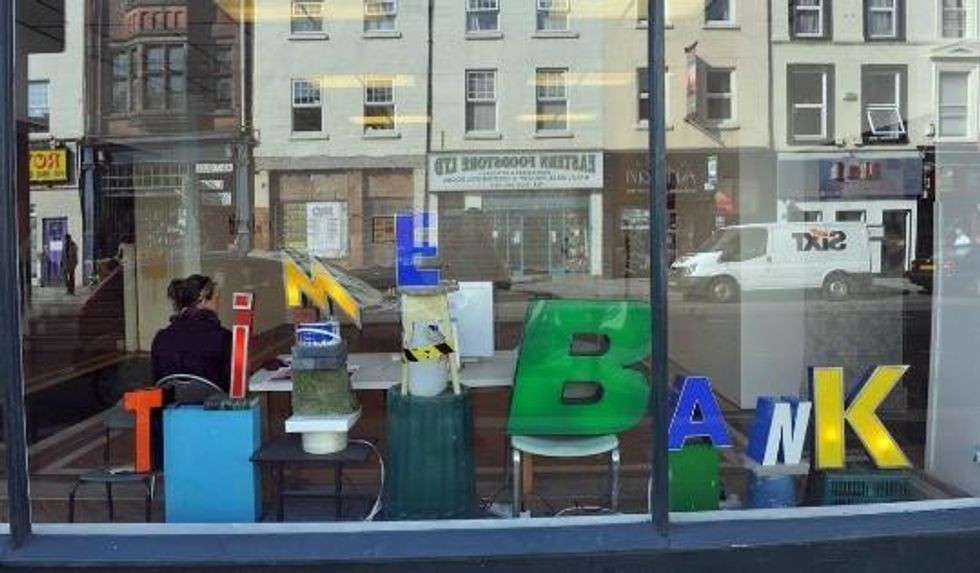In Cracks of Capitalism, Time Banks on the Rise
'If there was ever a time that this makes sense, it would be now'

Following the 2008 economic crash, the need for innovative approaches to the economy has only grown larger. One such answer to that problem has been a strong resurgence in the use of "time banks," a service for service exchange that skips the middle man of financial currency while building community in the process, according to a special report published by Al Jazeera America Sunday.
Time banks are organizations where individuals come together to offer services, traditionally within their immediate community. In return for providing a service, individuals earn "time credits" based on hours donated, which can be redeemed from any other service provider in the system. The exchange of money is avoided all together and each service is treated equally.
Since the crash, over 300 time banks have popped up around the United States alone, "located everywhere from Appalachia to Oakland and run by institutions ranging from art galleries to retirement centers to hospitals," Al Jazeera reports.
"There's a lot of unemployed folks and a lot of need, and if there was ever a time that this makes sense, it would be now," Edgar Cahn, a 78-year-old former staffer in the Kennedy and Johnson administrations and the founder of time banking, told Al Jazeera.
And in the digital age, time banking has been simplified and streamlined, enabling the idea and its implementation to be spread more easily around the world.
One such successful web-based time bank is the over 10,000-member Time Republik started by friends from Lugano, Switzerland. "One can look for someone to give oboe lessons over Skype or a neighbor to offer a ride to the airport," Al Jazeera reports.
Read the rest of the Al Jazeera report here.
An Urgent Message From Our Co-Founder
Dear Common Dreams reader, The U.S. is on a fast track to authoritarianism like nothing I've ever seen. Meanwhile, corporate news outlets are utterly capitulating to Trump, twisting their coverage to avoid drawing his ire while lining up to stuff cash in his pockets. That's why I believe that Common Dreams is doing the best and most consequential reporting that we've ever done. Our small but mighty team is a progressive reporting powerhouse, covering the news every day that the corporate media never will. Our mission has always been simple: To inform. To inspire. And to ignite change for the common good. Now here's the key piece that I want all our readers to understand: None of this would be possible without your financial support. That's not just some fundraising cliche. It's the absolute and literal truth. We don't accept corporate advertising and never will. We don't have a paywall because we don't think people should be blocked from critical news based on their ability to pay. Everything we do is funded by the donations of readers like you. Will you donate now to help power the nonprofit, independent reporting of Common Dreams? Thank you for being a vital member of our community. Together, we can keep independent journalism alive when it’s needed most. - Craig Brown, Co-founder |
Jacob Chamberlain is a former staff writer for Common Dreams. He is the author of Migrant Justice in the Age of Removal. His website is www.jacobpchamberlain.com.

Following the 2008 economic crash, the need for innovative approaches to the economy has only grown larger. One such answer to that problem has been a strong resurgence in the use of "time banks," a service for service exchange that skips the middle man of financial currency while building community in the process, according to a special report published by Al Jazeera America Sunday.
Time banks are organizations where individuals come together to offer services, traditionally within their immediate community. In return for providing a service, individuals earn "time credits" based on hours donated, which can be redeemed from any other service provider in the system. The exchange of money is avoided all together and each service is treated equally.
Since the crash, over 300 time banks have popped up around the United States alone, "located everywhere from Appalachia to Oakland and run by institutions ranging from art galleries to retirement centers to hospitals," Al Jazeera reports.
"There's a lot of unemployed folks and a lot of need, and if there was ever a time that this makes sense, it would be now," Edgar Cahn, a 78-year-old former staffer in the Kennedy and Johnson administrations and the founder of time banking, told Al Jazeera.
And in the digital age, time banking has been simplified and streamlined, enabling the idea and its implementation to be spread more easily around the world.
One such successful web-based time bank is the over 10,000-member Time Republik started by friends from Lugano, Switzerland. "One can look for someone to give oboe lessons over Skype or a neighbor to offer a ride to the airport," Al Jazeera reports.
Read the rest of the Al Jazeera report here.
Jacob Chamberlain is a former staff writer for Common Dreams. He is the author of Migrant Justice in the Age of Removal. His website is www.jacobpchamberlain.com.

Following the 2008 economic crash, the need for innovative approaches to the economy has only grown larger. One such answer to that problem has been a strong resurgence in the use of "time banks," a service for service exchange that skips the middle man of financial currency while building community in the process, according to a special report published by Al Jazeera America Sunday.
Time banks are organizations where individuals come together to offer services, traditionally within their immediate community. In return for providing a service, individuals earn "time credits" based on hours donated, which can be redeemed from any other service provider in the system. The exchange of money is avoided all together and each service is treated equally.
Since the crash, over 300 time banks have popped up around the United States alone, "located everywhere from Appalachia to Oakland and run by institutions ranging from art galleries to retirement centers to hospitals," Al Jazeera reports.
"There's a lot of unemployed folks and a lot of need, and if there was ever a time that this makes sense, it would be now," Edgar Cahn, a 78-year-old former staffer in the Kennedy and Johnson administrations and the founder of time banking, told Al Jazeera.
And in the digital age, time banking has been simplified and streamlined, enabling the idea and its implementation to be spread more easily around the world.
One such successful web-based time bank is the over 10,000-member Time Republik started by friends from Lugano, Switzerland. "One can look for someone to give oboe lessons over Skype or a neighbor to offer a ride to the airport," Al Jazeera reports.
Read the rest of the Al Jazeera report here.

